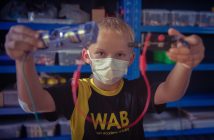A while ago, my adorable little nephew Daniel applied to, and was knocked back from, a Montessori kindergarten in London. As a still-wobbly toddler, what questions could he have possibly answered incorrectly to get himself booted out of kindergarten?
As it turns out it wasn’t so much what Daniel said than what Daniel did. He made his first impression at the school by flinging a chubby fistful of sand at a teacher, then pushing another toddler over and stealing his toy. Then he spent the remainder of the visit playing by himself. Pretty typical behavior for a toddler you could argue, but unfortunately not great timing when trying to impress the powers that be.
Concerns that my nephew was a tiny little bully aside, the episode got me thinking, what do schools look for when they meet potential new students, especially when the student is still a toddler?

The education philosophy of the parents play an important role in choosing a kindergarten and vice versa
According to Ellen Birnbaum, Director of Early Childhood Programs at The 92nd Street Y in New York City during an interview with Parents League, children will be expected to perform a few simple tasks during school visits including writing their name, drawing a person (or in a more advanced case, their family), puzzles or some kind of block design activity, and some sort of language assessment like telling stories or describing photos. If the visit is conducted in a group setting, how the child interacts socially will also be observed by the school staff. Are they sharing? Are they being polite? Are they able to follow a teacher’s direction?
But what about here in Beijing? Tara Gillan, Director of Operations at Beijing International Bilingual Academy (BIBA) shared a bit of insight into what she looks for when they meet the families applying to their Early Childhood Center (ECC) for children ages 2-4 yrs. “The two points that are most important to us when we’re meeting the family is first, are the children socially and emotionally ready to start kindergarten and second, is the family’s educational philosophy and idea the same as that of the school’s,” Gillan tells beijingkids.
Gillan goes on to explain that, especially for young children who are applying to ECC “The parents are the first teachers and the school is the second. It’s a joint team effort between the family and the school to raising and educating a child.” Which means the education philosophy of the parents play an important role in choosing a kindergarten and vice versa. “Otherwise we can’t meet the expectations of the parents,” explains Gillan.
So is there a way (or a private kindergarten hack, if you will) that’ll give your kids boost when it comes to the school visit? Birnbaum explains that it’s important to remember that the visit makes no sense for a young child so instead of a parent ‘preparing’ their child for the school visit, parents should be establishing a good routine with kids at home so that the kids are free to be themselves at school. She suggests reading to them, having real conversations with them where they listen to you but also vise versa, and in general, teaching children to be kind and share good family values. Birnbaum doesn’t recommend telling the kids about the school visit too far in advance because “they have a different sense of time”, but once the parents have told their kids about the visit, it’s ok to set some expectations. Finally, before you arrive, give you and your child plenty of time to calm down and feel relaxed. Your child will feed off your energy, as well as look to you for social cues, so if you’re relaxed and smiling then they’ll feel reassured that they’re not going into a situation where they’re being evaluated but rather a place where they can enjoy and be themselves.
When it comes to wardrobe, there are parents who overdress their kids for the school visit hoping to ‘dress to impress’, but Birnbaum recommends the opposite. Instead of putting kids in fancy party clothes that they’re not used to wearing, she says, keep it simple. Dress your kids in something that they’re comfortable in so they’re not distracted.
Lastly, always remember that the school visit is just a part of a much bigger puzzle. When assessing a child, the school also meets with the parents, and for older children also check tests and reports. At the end of the day, it doesn’t all come down to your child’s school visit so there’s no need to put so much pressure on them.
KEEP READING: Learn More About Beijing International Bilingual Academy (BIBA)
Photos: unsplash
Source: www.parentsleague.org




